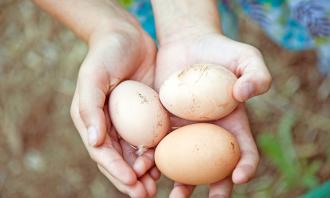OK, here’s the thing. Fruit and veggies contain all the best vitamins and minerals our bodies need, right? But did you know that you could get EVEN MORE benefits out of your fresh produce by simply leaving the skin ON?
Yes, we’re talking apples, pears and the like. But we’re also talking potatoes and sometimes even watermelon! Come again?
Recent research has suggested that leaving your skin on your fruit and veg not only fills your body with all the best vitamins and minerals your body needs, but can also prevent you from getting cancer.
Accredited Practicing Dietician Melanie McGrice recommends always leaving the skin on fruit and vegetables wherever possible.
“I mash potato in their jacket, leave the skin on pumpkin, carrots, eggplant, apples, kiwifruit and cucumbers,” Melanie tells Kidspot.
“And, although the rind on foods like banana, onion or watermelon may be a bit bitter and hard to digest just by taking a bite, they can actually be eaten in small amounts if cooked!”
Here’s why you should ditch the peeler too…
It provides an important source of insoluble fibre
The skin on fruit and vegetables provide an important and natural source of insoluble fibre, the all-important ingredient for a healthy gut.
“Insoluble fibre is important for digestive health and helps to keep us regular,” says Melanie.
“We can also get insoluble fibre from nuts, seeds and wholegrain bread, but the skin on fruit and vegies are one of the best sources.”
It can lower cholesterol and may prevent cancer
It has been suggested in the past that leaving skin on some fresh produce can lower cholesterol as well as possibly lower your risk of cancer.
Fruit that has been proven to particularly beneficial in these areas are apples, which are high in antioxidants.
It traps the nutrients in the food
“Another important role of the skin is to stop nutrients being lost during cooking,” says Melanie.
“Potato is a great example. The average potato contains about 30mg of vitamin C, which will provide over half of your daily vitamin C requirements. However, by peeling the potato then cooking it, you will destroy significant amounts of that vitamin C.”
If you really have to peel a vegetable, most experts recommend doing so after cooking than before.
High in vitamins
When it comes to nutrients in your fresh fruit and veg, the pigments in the produce plays a big part, particularly the really colourful variety!
Colourful peels can be a concentrated source of beneficial phytochemicals, a good source of insoluble fibre and rich in iron, potassium and B vitamins.
Best of all… not peeling saves you time!
Fresh fruit and veg is the ultimate fast food. Who doesn’t love the ability to just wash an apple and munch right away?
“Not peeling saves you time! Give them a quick wash, and they’re ready to eat,” Melanie adds.






















